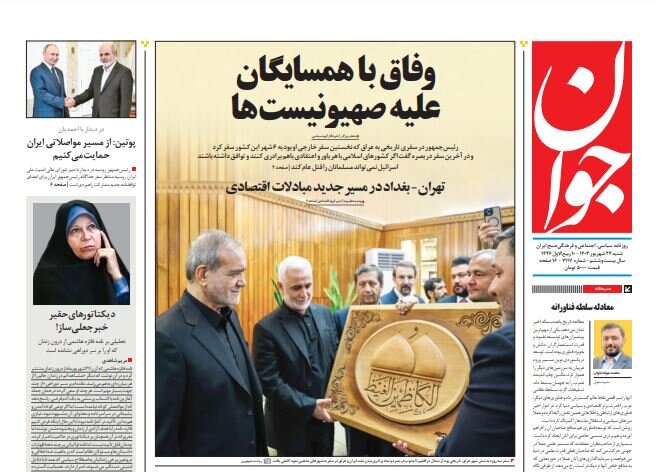Agreement and consensus with neighbors against the Zionists

TEHRAN - In a commentary, Javan pointed to the visit of President Msoud Pezeshkian to neighboring Iraq.
The paper said: Iraq was chosen as the destination for the first foreign trip of the president of the 14th (sitting) government, a three-day intensive trip that had many achievements. The visit took place within the policy neighborhood diplomacy to the signing of 14 cooperation documents in different fields that can lead to economic prosperity. In a historic trip to Iraq, the president visited 6 cities in the country. In the last leg of his trip to Iraq, he visited Basra, where he said that if Islamic countries with different denominations fraternize with each other and have an agreement, Israel will not be able to massacre Muslims. The message of unity was given to the neighboring countries by the president of Iran from the city of Basra. The manifestation of the religious beliefs of Muslims is unity against enemies, including the Zionist regime. Therefore, differences must be put aside to form the unity of the Islamic ummah.
Donya-e-Eqtesad: Shadow of sanctions on bilateral relations
In a note, Donya-e-Eqtesad pointed to the president's visit to Baghdad and the impact of sanctions on Tehran-Baghdad bilateral relations. It wrote: One of the most raised issues between Iran and Iraq, which was on the agenda of the visit of the president and his delegation to Baghdad, was the release of 11 billion dollars of Iranian assets blocked in Iraq. Apparently, the release of these blocked assets was not agreed upon during this trip, and Baghdad is still waiting for Washington's green light to resolve the issue. It is a part of the dispute between Iran and America over sanctions, and until we see a change in this regard, it is unlikely that Iraq will be able to unfreeze these assets. Considering the war in Ukraine, the claim that Iran has sent short-range ballistic missiles to Russia, the war in Gaza and the possibility of Iran's response to Israel, and the upcoming elections in the United States, achieving such a process seems unlikely for at least the next few months.
Arman-e-Melli: Iran seeks to deepen its relations with Russia
In an analysis, Arman-e-Melli wrote: The Europeans are very afraid of Russia's actions against Ukraine, and during the days after Russia's war against this country, they have sent a lot of financial and military aid to Kyiv to resist Russia. They react to every Russian advances in Ukraine and attribute it to Iran. Of course, it is intended to put pressure on Tehran. Tehran has always tried to expand its relations with Russia in political, economic, and military dimensions, and now there is a possibility that the date for signing a contract to transfer the Russian gas to Iran is approaching. In addition, Tehran and Moscow have always tried to get closer to each other as they are classified in the Eastern bloc against the United States. Considering that the Europeans are opening a new case against Iran related to Russia, the secretary of Iran's Supreme National Security Council traveled to Russia to attend the BRICS security chiefs and security advisors as well as representatives of some countries in the Global South.
Hamshahri: We do not hesitate to react to ill-advised actions
In an article, Hamshahri discussed the provocative actions of three European countries and possible approval of a sanction resolution against Iran. It said: Iran fulfilled all its obligations under the agreement until one year after the withdrawal of the United States from the JCPOA because Iran wanted to give a chance to the European countries that promised to compensate for the effects of Washington's withdrawal from the agreement and fulfill their promise. However, since European countries have not fulfilled their promises, Iran also reduced its obligations under the JCPOA in several steps. In an agreement later known as the March 4 Joint Statement, the Islamic Republic of Iran voluntarily agreed to increased verification and monitoring activities by IAEA inspectors. However, the experience of the past 4 years showed that despite the claims of diplomacy, the White House does not have the necessary will to decide to return to the JCPOA and compensate for the failed policy of President Trump's administration against Iran. The Islamic Republic of Iran also emphasizes that whenever the other parties fully fulfill their obligations, it will act reciprocally, but Iran is ready to react to any ill-advised position and action.
Leave a Comment